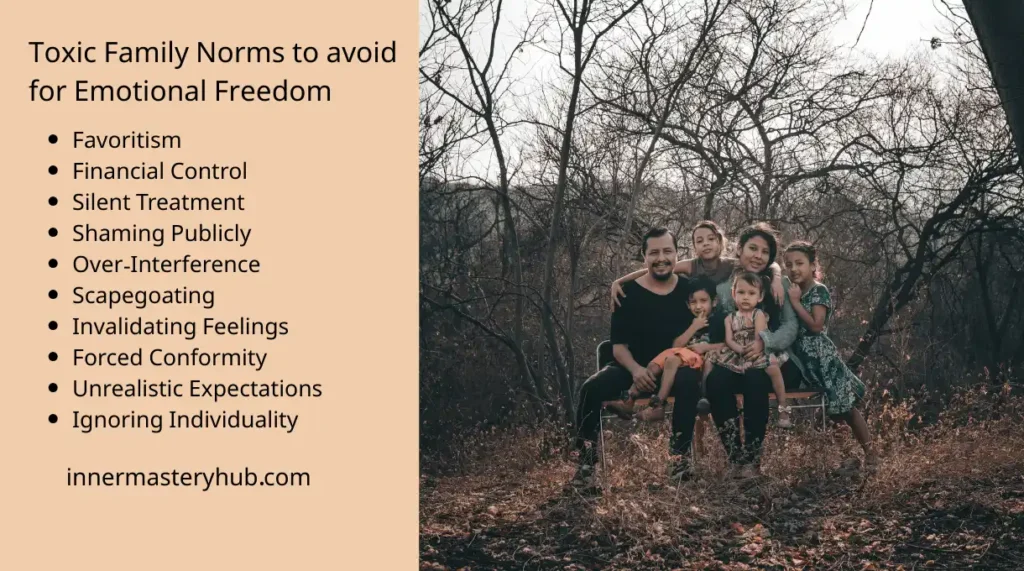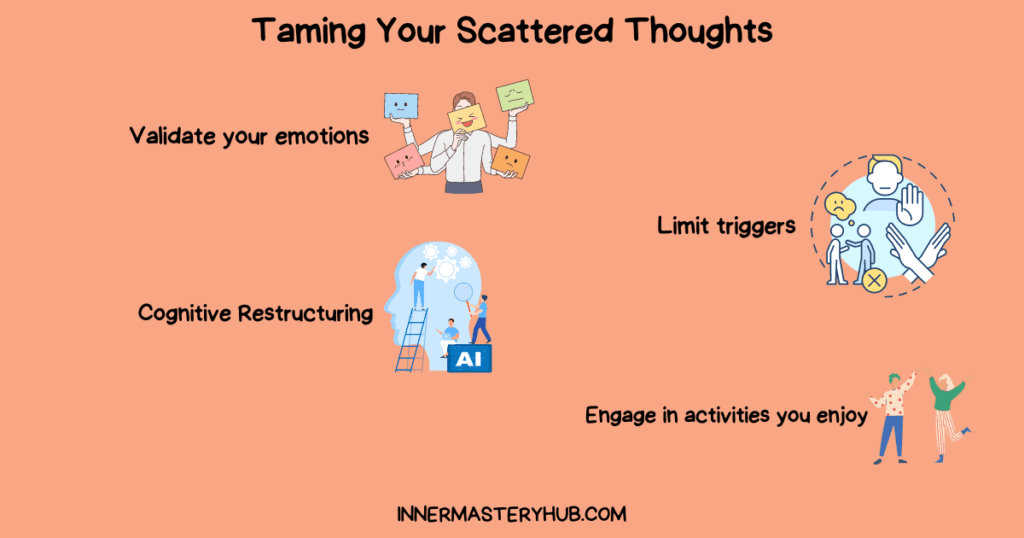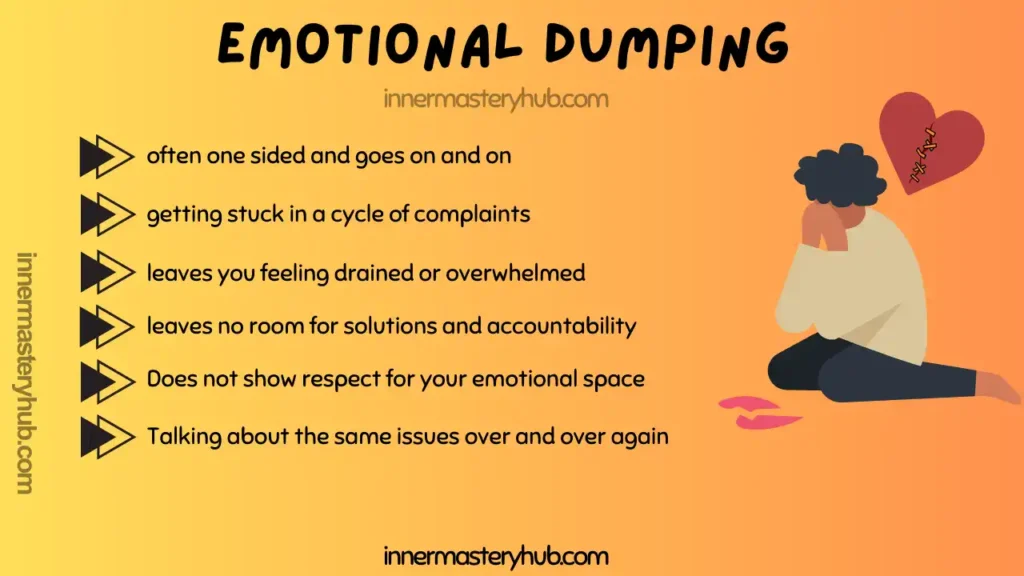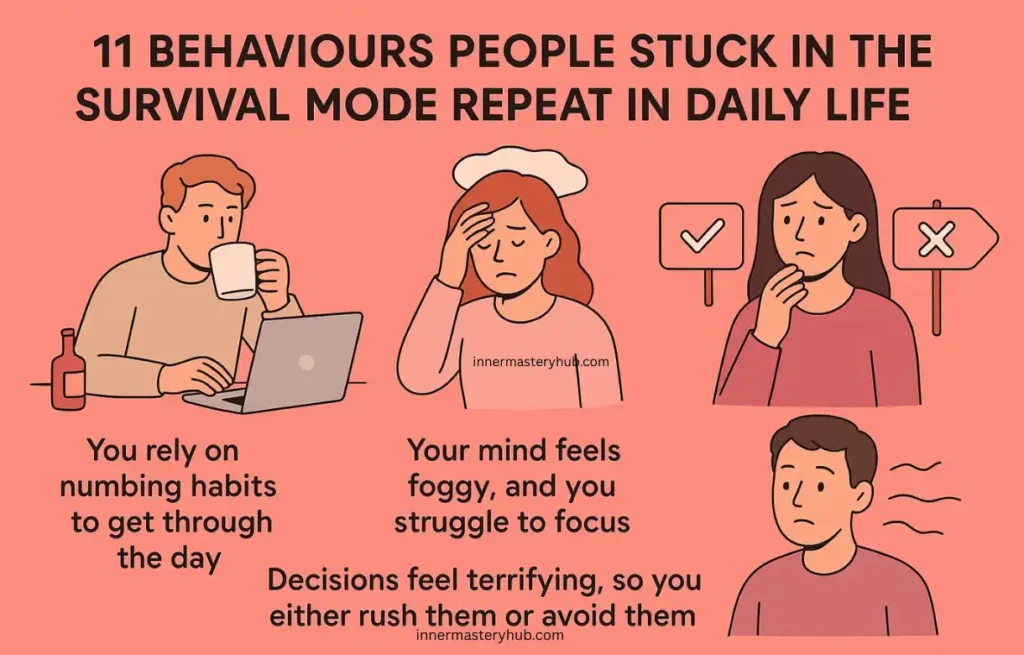23 Toxic Family Behaviors to avoid for Emotional Freedom

Our families shape our sense of belonging; however, toxic practices such as favoritism, financial control, or emotional manipulation can harm trust, undermine self-worth, and limit independence.
Imagine a sibling who is devalued by continual comparisons or an adolescent who is overburdened by unjust obligations—these toxic family behaviors cause emotional damage that lasts a lifetime.
23 Toxic Family Behaviors to Avoid
Are you prepared to make your house a respectful and encouraging place by learning about Toxic Family Behaviors to avoid?
Physical Abuse
In families, physical abuse is when someone uses force, such as pushing, slapping, or beating, to control or punish others. This may result in long-lasting mental and physical harm. It is hugely damaging and destroys confidence.
For instance, a parent may severely spank a child for minor mistakes, believing that this is a kind of discipline, but in reality, it only instills terror. Rely on positive reinforcement and look for therapy or anger management assistance to communicate without using violence to prevent this.
Emotional Struggle
Emotional manipulation is when family members use emotions to achieve their goals, such as using fear or guilt to win over judgments. It can cause self-doubt and is a cunning tactic.
You might have a brother who constantly complains about being “abandoned” anytime you had to cancel arrangements because they were absent. The solution? Set clear boundaries, use open communication to identify and avoid harmful habits early.
Verbal Abuse
Verbal abuse is when someone is subjected to derogatory comments that gradually damage their self-worth, such as yelling, insults, or threats. It’s toxic; it’s more than simply arguments.
Imagine a partner who feels unworthy because their spouse calls them “stupid” during every argument. Instead, adopt polite communication patterns and utilize “I” expressions like “I feel frustrated” and pause before speaking in anger.
favoritism
Favoritism is one of the most widely practiced toxic family behaviors to avoid. When parents or guardians clearly favor one child over another by showing them more love, gifts, or leniency. This results in low self-esteem and feelings of jealousy in the person being neglected. Giving one child constant recognition for their accomplishments while disregarding the other’s efforts is one example.
Instead, parents should avoid this by treating everyone fairly, recognizing each person’s unique strengths, and holding family gatherings to make sure everyone is acknowledged and respected.
dishonesty
Lying or concealing facts, whether they are minor lies or major secrets, undermines confidence in families. For instance, a parent concealing financial difficulties or a teenager exaggerating what they are doing to get out of trouble. Provide a secure environment for honesty, acting honestly yourself, and politely confronting lies with conversations on the importance of trust to prevent it.
Management of Finances
Using money to control family members, such as by denying them access to money or an allowance as a form of discipline or to force their decisions, is known as financial control. This is the height of power play. Assume that one partner oversees all bank accounts and inspects every dollar spent by the other. Let independence and collaborative financial planning prevail in your financial matters.
Silent treatment
Shutting off communication and ignoring someone for days as a form of punishment is known as the silent treatment, a toxic family behavior to avoid. It feels like emotional rejection, isolation, and passive-aggression.
The home becomes uncomfortable where such toxic family behaviors to avoid are commonly employed, for instance, when a family member refuses to acknowledge you or speak after a dispute. To prevent, make a commitment to calm down for a little while before discussing it, and use expressions like “I need space, but let’s chat soon.”
Too Much Criticism
Family members who receive unfair criticism may feel incompetent since they are constantly criticized for their shortcomings or errors without any sense of balance. It is discouraging.
Consider a parent who constantly picks faults with their child’s homework or attire. Correct it by sandwiching criticism—give praise, offer suggestions for growth, and then give more love—and concentrating on building confidence rather than jeopardizing it.
Shifting the blame
Shifting the blame places all the burden for problems on other people, avoiding personal responsibility, and making people defensive. This game of blame splits families.
Like one individual always says, “This is your fault!” without taking responsibility for their own involvement in a family incident. Reflecting on yourself and asking, “How can we fix this together?” as a team question, and expressing regret when you’re incorrect, can provide solutions.

Controlling Behavior
Controlling behavior limits freedom by regulating every element of family members’ lives, including who they see and what they wear. It’s oppressive. An illustration would be a parent monitoring their adult child’s every action. respect autonomy, and promote decision-making. If the behavior is severe, treatment can help identify and modify it.
Ignoring Conversation
Avoiding conversations about emotions, problems, or plans is known as neglecting communication, and it can result in miscommunication and emotional detachment. This is how families move apart. Never talking about everyday stress, for example, causes rivalry to grow unacknowledged. To help everyone feel included and understood, plan occasional check-ins, such as family dinners without electronics, and engage in active listening.
Public Shaming
A family member’s dignity and trust are destroyed when they are publicly humiliated, such as when they are reprimanded at events. It’s relentless and embarrassing. Imagine a father shouting at a family gathering about a teenager’s grades. Deal with toxic family behaviors or problems in private; instead, give constructive public recognition and use empathy when making fixes.
Not Showing Love
Withholding affection makes loved ones feel hated by refusing them support, encouraging words, or support as a tactic during arguments. It’s harmful and cold. For example, A spouse refrains from all physical contact for weeks following a disagreement. Keep feelings and affection apart; show love often, handle damage head-on, and start over every day with tiny acts of kindness.
Too Much Interference
Meddling unnecessarily in family members’ private lives, such as offering unsolicited advice on their relationships or careers, is known as over-interference. It weakens self-reliance. Take an example of a daily phone contact from an in-law who wants to “help” with decisions about raising children. To avoid, respect boundaries, wait for invitations to offer advice, and offer remote support when necessary.
Scapegoating
Scapegoating places the blame and annoyance on one person, who is therefore held responsible for all family issues. It is unjust and alienating, such as attributing all family disputes, including those that are unrelated, to the youngest sibling. Share duties equitably, increase group problem-solving.
Breaking of Promises
Repeatedly breaking commitments, such as promising to attend an event but then canceling, damages a family’s trust and dependability. It’s a huge letdown. For example, a parent who often cancels family outings due to work. Solution for this can be rebuilt by continuously following through, expressing adjustments early with an apology, and only committing to what you can manage.
Unfair Comparisons
“Why can’t you be more like your brother?” is an example of an unfair comparison that sets family members against one another or strangers. It makes people feel insecure. When parents publicly compare their siblings’ grades, it can make one feel unworthy. Please stay away from comparing languages, celebrate each person’s own development, and praise their distinct talents.
Forced Conformity
Family members are under pressure to adopt the group’s values, norms, or trajectories while ignoring individual distinctions. It suppresses. For example, requiring everyone to submit to the same faith or profession against their choice. The answer is to support diversity, encourage exploration of interests, and engage in judgment-free, open discussions about values.
Unrealistic Expectations
Unrealistic expectations create stress and failure by demanding perfection or unachievable goals. It’s too much. For instance, encouraging a child to succeed in athletics while their interests are elsewhere can result in burnout. Overcome by valuing well-being above perfection, adjusting based on skills, and jointly establishing attainable goals.
Ignoring Individuality
People feel invisible when their individuality is ignored in favor of a “family mold,” which ignores their needs, hobbies, or uniqueness. It homogenizes them. Consider labeling a teen’s distinct style as “weird” and pressuring them to fit in. The answer is to encourage self-expression, discover one another’s interests, and provide room for individual development within the family.
Guilt as a Tool for Discipline
Saying “You’re making me sad” rather than outlining rules is an example of how using guilt as a kind of discipline manipulates emotions to impose actions. It is a burden. The following is an example of a parent using guilt to get a youngster to do chores: “After all I’ve done for you.” Use positive counsel and clear penalties to prevent, stressing instruction over emotional pressure.
Absence of Responsibility
Refusing to take responsibility for one’s actions or provide an apology is a sign of a lack of accountability, which fuels toxic family behavior and resentment. It is a hypocritical act.
When a family member ruins plans, they never take responsibility and instead place the blame on others. Set a good example by being honest about your mistakes, offering genuine apologies, and sharing your learnings to promote a culture of forgiveness.
Building a Healthier Family Future
Identifying which toxic family behaviors to avoid is the first step in changing them, even though they may sap trust and self-worth. These behaviors can range from manipulation to discrimination.
Families can break destructive cycles by fostering open communication, upholding clear boundaries, and seeking help, such as counseling, when needed. Let’s make a commitment to nurturing compassion and understanding in order to establish households where each individual feels appreciated and equipped to succeed.
Frequently Asked Questions about toxic family behaviors to avoid
What are poisonous family behaviors to avoid?
Like gaslighting or favoritism, toxic family behavior manipulates, abuses, and controls emotional well-being. It undermines generations-old trust and self-esteem. Early detection enables therapy and boundaries to break cycles—respecting and supporting relationships through healthy communication.
How to deal with emotional manipulation as a toxic family behavior?
Like guilt-tripping, emotional manipulation manipulates sentiments for control. Notice patterns of skepticism or pressure. Set limits, speak up, and get therapy. Journaling tracks incidents—self-care; distance if needed. Self-awareness restores autonomy and healthy relationships.
Why do parents show favoritism?
Yelling, insults, threats, and self-deprecating comments are signs. It turns discussions into attacks, worrying victims. One-sided and repetitive, unlike a good debate. Inform reliable friends and record incidents. Therapy helps; learn “I” sentences to respond. Leave if unsafe.
How to stop dishonesty in family relationships?
Unresolved concerns include placing hopes on one child or compensating for past losses, which can lead to favoritism, resulting in resentment and low self-esteem. Unconscious prejudices contribute. Discover roots through family therapy. Celebrate all accomplishments equally to promote justice and harmony.
How to treat the toxic family behavior of practicing dishonesty?
Through secrets or lies, dishonesty undermines trust. Encourage transparency by setting an example of integrity and establishing safe spaces for the truth. Talk about the repercussions in a non-punitive manner. The reasons behind it are revealed by family counseling. Frequent check-ins promote openness. Rebuild by taking persistent action; accountability leads to forgiveness, which gradually fortifies ties.
What does family financial control mean?
Financial control, such as restricting expenditure or withholding funds, uses money to exert dominance. It fosters resentment by limiting independence. Typical in parent-child relationships or marriages. Encourage transparency and collaborative budgeting. Seek treatment or financial education. In cases of abuse, legal counsel is helpful. Boundaries and financial literacy lead to empowerment.
What effects does the silent treatment have on family members?
Silent therapy causes emotional estrangement, self-doubt, and worry. Passive-aggressive punishment exacerbates disputes. Break it by quietly communicating your requirements once you’ve calmed down. Healthy conflict resolution is taught in therapy. Encourage “timeout” policies through follow-up discussions. To avoid escalation and preserve connection, put empathy first.
What causes over-criticism in families?
Excessive criticism might be caused by stress, perfectionism, or childhood-learned tendencies. It crushes confidence, leading to avoidance or rebellion. Balance with praise; use constructive feedback. Patterns are found through family therapy. Focus on strengths to shift dynamics. Self-reflection aids critics, while positive affirmations help victims become more resilient.
How to handle blaming as a toxic family behavior in arguments?
By shifting accountability, blaming encourages defensiveness and hurtful cycles. Own your role by using “I” statements. Encourage problem-solving in teams. Therapy encourages responsibility. Let disagreements cool down. To find trends, keep a journal. Empathy minimizes culpability; applaud collaborative solutions. This efficiently settles disputes and fosters mutual respect.
Why is controlling toxic family behaviors harmful in families?
Controlling restricts freedom of choice, which breeds discontent or insurrection. It comes from insecurity or fear. Establish firm boundaries and look for underlying causes in therapy. Promote self-reliance by making decisions together—respect personal development. To foster trust and personal growth, healthy families strike a balance between direction and autonomy.






